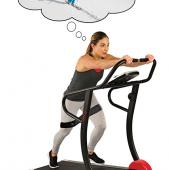Mind Craft
Improving mental health through exercise.
We are lucky to live in and around Bozeman. We have seemingly infinite access to opportunities for outdoor adventure and physical fitness. However, our state consistently has one of the highest suicide rates in the nation. Many Montanans have limited access to mental-health services. Over the past several years, links between physical exercise and better mental health have been better understood in health care and throughout society. Can we use our local culture of adventure and access to trails to help decrease suffering in people with mental illness? Through open discussion, education, and community involvement, we almost certainly can.
Exercise & Mental Health
Several recent scientific studies show decreases in the severity of depression and anxiety with regular exercise. Though the types and duration of exercise studied vary, a recent review article looking at multiple sources found that exercising 30-40 minutes, four days per week, for at least 2-3 months has significant positive effects on mental health. Given strong evidence of the efficacy of exercise, in 2010 the American Psychiatric Association added monitored exercise as a first line of treatment for major depressive disorder.
There is little consensus regarding why exercise can be so helpful. Theories range from chemicals released from burning fat cells, to systemic release of endorphins, to actual changes in brain chemistry. Even the heat generated in the body during exercise, and the feelings of accomplishment following exercise, may be involved. Further study is ongoing, but for now we know that the strong effects of exercise are generally worth a try.
Practical Application
First, exercise alone does not substitute for proper medical care. Family doctors, counselors, and psychiatric specialists should always be consulted if a person is experiencing changes in mood or thoughts of suicide. If you have not exercised in the recent past, talk to your family doctor before starting a program.
Exercise can take many forms. Walking and hiking are generally available to people free of charge, and Bozeman provides a beautiful environment for both. Biking, skiing, aerobics classes, basketball… nearly any sport that raises one’s heartrate for an extended period of time can be used. People can mix and match sports for added variety. The only requirements for health benefits are that exercise be at least 20 minutes in duration, occur at least 3-4 days per week, and be done consistently as part of one’s regular lifestyle. Though this sounds simple, many barriers to regular exercise exist.
People with health problems of any kind often have limited financial resources, making walking, hiking, and running more realistic options than other sports. Unfortunately, even activities such as walking can cause injury, or may be difficult due to a pre-existing injury. Establishing a good relationship with your primary-care doctor or physical therapist prior to beginning an exercise program, or as a result of an injury, is incredibly valuable. In addition to assisting in your recovery, physical therapists are particularly good at devising modified fitness plans to be followed when you are unable to complete your regular exercise.
Another major barrier is low motivation caused by the very mental-health problem for which one is using exercise. This barrier is the reason the APA specifies monitored exercise as a first-line depression treatment. Since monitored exercise by a mental-health professional is generally beyond the reach of most people, we have to be creative here. Committing to a friend or group to walk together a couple days each week can be incredibly helpful by increasing accountability and simply by making exercise more fun. If a close friend knows you use exercise to help your mental health, give that person permission to check on you if you skip your regular exercise dates. Communication saves lives and decreases suffering associated with depression.
Consider joining a local running, cycling, or hiking group. These groups, or even local races, are great places to meet other people looking for workout buddies. There are several free apps that can keep a record of your exercise and add structure to help you stay consistent. Just remember that, as mood disorders can steal your motivation, your exercise goals need to be a bit fluid. For example, when doing well, you may wish to walk or run 30-90 minutes, five days per week. When depression strikes, getting out the door for a five-minute walk may be an appropriate goal. Though this may not be a sufficient dose of exercise to produce a mood change, it will keep you in the habit of regular exercise. Making seemingly silly goals can be helpful too. Consider trying a new trail once a month, taking a non-exercising friend on a walk, or volunteering at athletic events regularly. Explore new sports. Take your neighbor’s dog on a walk on a regular schedule. Know that remaining motivated to exercise can be difficult, particularly when depression and anxiety increase. When doing well, make plans to keep yourself on track during times when your mood tells you to lie on the couch.
Moving Forward
This is far from an exhaustive exploration of exercise and mental health. Rather it is a small introduction to using exercise to increase quality of life. If you suspect that you or a loved one may be suffering a mood disorder, please get medical help. Primary-care providers and other mental-health professionals treat these problems every day. Though seeking help can be intimidating, these providers have great understanding and empathy, and will not be surprised by such a request. If you have suicidal thoughts and need help immediately, call the Bozeman Help Center at 406-586-3333 or the National Suicide Prevention Lifeline at 800-273-8255. These numbers work every day at any hour, and your call is completely confidential. The latter also has live chat available at suicidepreventionlifeline.org.
Anne Thomas is a clinical assistant professor of psychiatry at the University of Washington and a psychiatrist at Bozeman Health. Nikki Kimball is a physical therapist at Excel Physical Therapy who uses her professional running career to advocate for those affected by mental illness.











